Introduction
In this project, our goal was to create narratives and tell stories using various media. In this time, we studied how stories are told and used that information to create our own stories and characters.
One thing that I valued about this project was that we were pushed to tell a story or show a creative idea within limitations, whether the limitation be in the assignment itself or in the amount of time that we had to work on it. I think that this made me a better storyteller because I learned to tell a story efficiently and without extra fluff.
Story
For our written narrative, we were expected to write within five pages, which meant that we had to create a story that was concise and limited, but still told a good story. This proved to be a challenge for me (and many others), because I had a hard time developing the character within the span of about a day. At first, I wanted to make my character develop in a way that had him “find himself,” but thanks to Mr. Greco, I realized that it would be very unrealistic to tell that story in five pages.
Process
In English class, our assignment was to write a short story. The only limitations were that it had to be five pages or less and that the themes must be family-friendly. For my story, my inspiration laid in my love for music. My story is about the bond between two brothers strengthened by the gift of music, and I think that I definitely projected my personal feelings into the story, because music bonds me with my friends and my violin teacher.
To kick off the project, we were tasked to answer a grueling, 50-question, character questionnaire from the perspective from our protagonist. Below is a screencap of a portion of the questionnaire. Since I answered the questionnaire, I changed my protagonist from the one answering the questions to the brother, who is mentioned in the answers. It was a good and challenging exercise in characterization.
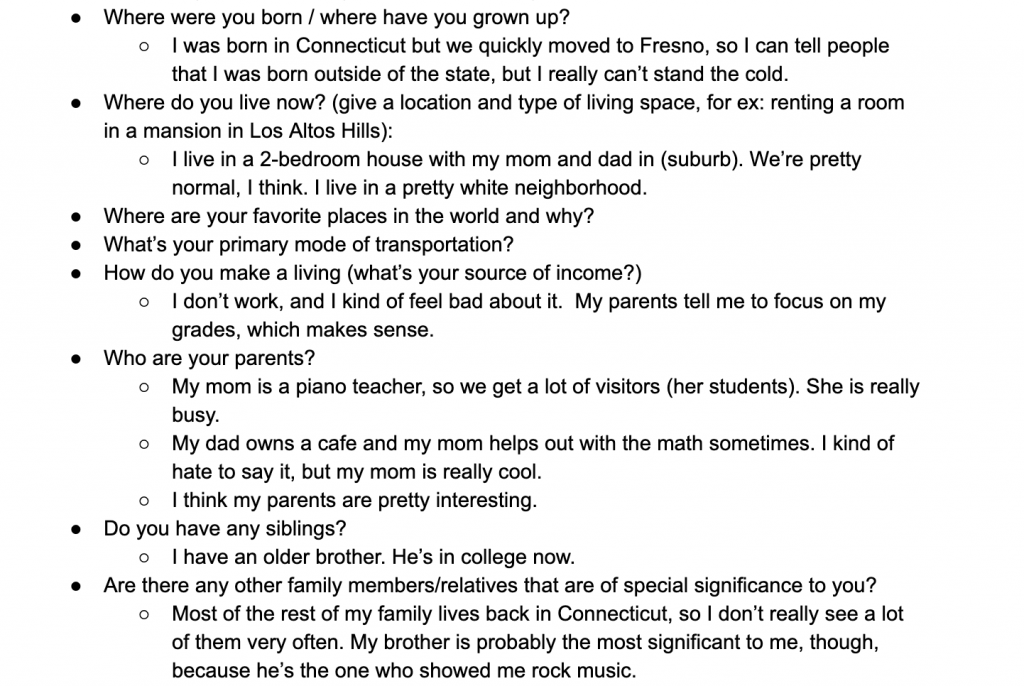
We also created a plot map following Freytag’s Pyramid (exposition/climax/resolution) or the Hero’s Journey plot map (status quo/obstacle and high stakes/new status quo). I chose to use Freytag’s Pyramid, since I thought that it was a bit simpler to think about and because I didn’t think of my protagonist as a “hero.”
Audio Production
To create the audio for our short stories, we first recorded ourselves reciting the story at home (using a portable recorder given to us by Freestyle), and then we added music and sound effects using Avid Pro Tools.

Me and My Guitar
Not even college applications pained me as much as seeing my little brother eat by himself. He was sitting on the left side of one of the rusty, run-down wooden benches scattered across the school, headphones in, his legs crossed with his Star Wars thermos sitting on the bench next to him, aimlessly shoveling forkfuls of leftover spaghetti and marinara into his mouth as he gazed at his phone screen.
At lunch, I always sat with my bandmates. We were a tight group had four people: Adam, the lead guitarist and de facto leader of the group, Tracy, our singer, Justin, our bassist, and me, Andrew, the drummer. That day, I was the second person to arrive at our table.
“Hey, Andrew,” greeted Adam.
“Hey, man,” I responded.
“So, we were thinking, you know, about our group, I was jamming with some guys the other day, and I found this amazing drummer. Like, dude, he was pounding on that drum set like there was no tomorrow. You could feel the passion coming through those sticks. He doesn’t go to our school, though, so it would be kind of hard to schedule stuff, but I was wondering what you would think about adding a fifth member to the group.”
All of a sudden, a wave of jealousy flooded through me.
“We don’t need two drummers,” I snapped.
“I know, but I was thinking that he could be the drummer, and you could play guitar. I know you play. Of course I would still be the lead, but it would be nice to have someone to play the regular chords in the background while I do the riffs and tricks.” While Adam was grinning, I could feel my face settling into a deep frown, as much as I willed it not to change.
Usually, I would go along with what Adam says. He wasn’t necessarily a bad person, but he tended to float around in his own head and overlook my friends’ and my feelings. We all understood, though, that he never meant to neglect any of us. It was that collective knowledge that made our group feel safe and welcome around him, despite his quirks. However, that day, I just couldn’t bring myself to recall that.
“I don’t think that’s gonna happen,” I gritted.
The crestfallen expression on Adam’s face pierced through my envious rage, and I realized my mistake. His expression turned from disappointment to disdain as Tracy and Justin joined us. The two newcomers looked at me, then looked at him, and sat down, shifting themselves over towards Adam. I sat quietly, wallowing in my regret. Just a couple of feet away from me, my friends started chatting with each other, trying to break up the awkward air at the table, but I stayed silent.
In a rush, I stood up and walked away. At the time, it felt like my legs were moving on their own as I walked away from our table’s lively conversation and towards my brother’s lonely, nerdy bench. In retrospect, they were probably more worried about me than not, but in my mind, I could feel their judging eyes pierce through my clothes.
When I arrived at the rusty bench, I sat down next to my brother. He didn’t look up. “Hey, Steven, don’t you have any friends to talk to?” Steven whipped his head up from his phone to face me. He removed one of his headphones and glanced around warily, like a cat.
“Are you making fun of me?” he asked.
“No–I just wanted to make sure you were doing okay. Do you need any help with, you know, making friends?”
“You’re making fun of me.” He glanced at my friends, my bandmates, behind me. I looked at them too. They were guffawing and chortling at each other, like they normally did during a Wednesday lunch.
“I could give you advice on how to get people to like you.” I said.
Steven’s expecting eyes locked onto mine, and suddenly, my mind went blank.
“Well, uh, to start off, you could talk to people more often. Smile at them. Say ‘hi’ to them in the hallways.” Steven’s face started to fall. “You could, uh, try to sit up straighter to look a little more confident,” I pushed out.
The change in his expression was clear. “Shut up,” Steven snapped, turning away from me. “You sound just like Mom.”
The bell rang, and Steven got up and walked away, both headphones in.
+ + +
“I’m home,” I announced. Nobody answered. I sighed.
I closed the door behind me and stepped through the hallway. I swung open the door to the room that I share with my brother.
“Hi Steven,” I said. My eyes locked onto my brother, who was lying on his bed, sluggishly dragging his thumbs over his phone screen. He didn’t even look up. I could hear the pounding of drums blaring from his headphones, which worried me.
I plopped myself down onto my bed, which was on the other side of the room from Steven, and took my laptop out of my backpack. Assuming a similar position to my brother’s, I rested my head on my pillow and rested my laptop on my legs as I opened the documents I was using to write my essays for college.
My prized guitar, leaning against the wall by the foot of my bed, caught my eye. It was a classic, beautiful Fender with a sparkling auburn on the side and a bright white splashed across the face. I bought it three years prior, in my freshman year of high school, and I had to get a bunch of forms from my high school’s office to be able to work at an ice cream store to save up to get it. My parents refused to buy something so expensive and so unrelated to school, so I took it upon myself to earn what I wanted most.
At that time, it was the most beautiful thing I had ever laid my eyes on. But when I was waiting for the CommonApp website to load, it was still beautiful, but it had gotten dusty and dull from disuse. My desire to be a hardworking, good student trumped out in the end, and being the drummer in our band, I did not have much reason to practice the guitar.
I looked at my brother, who was still playing games on his phone.
“Hey Steven, do you want my guitar?”
Surprisingly, he took one of his headphones out. “What?” he replied.
“Do you want my guitar?” I repeated.
His eyes widened. He quickly glanced from my guitar and back to me, then back to the guitar again. “Are you sure?” he asked.
“Yeah.”
I could hear him muttering excitedly under his breath as he jumped from his bed to claim his new guitar. He grabbed the neck and raised it up from its stand, cradling the body of the guitar with his right arm. He attempted to strum but he had forgotten to put on the neck strap, so the instrument kept slipping from under his fingers. I looked at my brother, who seemed excited to spend time with me and my guitar, and remembered my friends. It would be difficult to talk to them after walking away from the group so suddenly, but I had faith that I could feel a little bit less lonely with my brother.
“I could teach you how to play,” I mentioned.
Steven looked at me with a new quizzical expression. “Why are you doing this? You’ve never let me touch this thing before,” he asked.
“I dunno. I don’t really have time to play it anymore.”
“Oh, ok.”
“Well, do you wanna know how to play?”
“Yeah, sure.”
Short Story Author Study Essay – Kurt Vonnegut Smokes Too Much
Kurt Vonnegut, author of Welcome to the Monkey House, is no stranger to vice. He himself states in his preface, “My sister smoked too much. My father smoked too much. My mother smoked too much. I smoke too much.” He knows that he should not smoke, but he does it anyway. This theme is prevalent throughout his work. In many of his short stories, Vonnegut suggests that though everybody has their own morals and image that they wish to portray, they will always fall prey to their primal emotions and desires.
This theme deals with the idea that within each person, there are multiple parts or personalities. The theme of the duality of the self is present in many literary works, including a famous ‘flow of consciousness’ essay by Argentine author Jorge Luis Borges titled “Borges y Yo” (Borges and I). In this essay, he describes the disparity between the public, famous author “Borges” and the private “Yo.” Borges writes (translated), “I like hourglasses, maps, the typography of the 18th century, etymology, the taste of coffee, and the prose of Stevenson. He shares those preferences, but in a vain way that changes them into attributes of an actor.” In Borges, there is a split between the person he is on the inside and the person that appears through his writing. For many of the characters in Vonnegut’s Welcome to the Monkey House, though, these splits appear between their ethical selves and their unethical selves.
The most prominent example of this split is in the story “The Foster Portfolio.” The narrator is a financial advisor who Herbert Foster, a seemingly humble and meek man, hired to take care of his money. Herbert has hundreds of thousands of dollars’ worth of bonds stored away, hidden from his wife and family. He refuses to use the money, though, because he wants to work for the things he wants to buy, and he does not want to be a ‘lowlife’ like his father. At the end, the narrator looks for for Herbert at the restaurant he works at, and he finds out that Herbert was secretly playing jazz in a dingy bar under the alias “Firehouse Harris,” playing the same dirty music that his father did.
It is clear that in this story, there is a distinction between the ethical ‘Herbert Foster’ that Foster shows to his family and the narrator and the less ethical ‘Firehouse Harris’ that smokes and drinks and plays jazz. When talking with the narrator, the financial advisor, Foster makes it very clear that he only takes after his ethical and responsible mother, and not his father. When the narrator asked Foster about his father, Foster replied, “Home and family meant nothing to him. His real love was for low-down music and honky-tonks, and for the trash in them” (68). Through this statement, Foster reveals a great deal about himself. First, he characterizes himself as a family man by denouncing his father (which is a bit contradictory). Then, he reveals that he may not loathe his father as much as he seems. By repeatedly describing his father’s music as bad (low-down, honkey-tonks, trash), the statement acts like a hyperbole, creating a sense of sarcasm or insincerity, which suggests that Foster actually respects his father’s music. This shows the duality between the side of Foster that comes from his mother, and the side of Foster that comes from his father. In addition, the statement, with its subtext, demonstrates the duality between the Foster on the surface and the Foster who he keeps private. Finally, this statement shows Foster’s desire for a “real love” as opposed to a life that “means nothing to him.”
Near the end of the story, the narrator watches Herbert Foster sit down at a piano in the dingy bar and says, “He took a cigarette from his breast pocket and lighted it…Startlingly, Herbert Foster disappeared. In his place sat an excited stranger, his hands poised like claws. Suddenly he struck, and a spasm of dirty, low-down, gorgeous jazz shook the air, a hot clanging wraith of the twenties” (73). Again, the difference between the meek Herbert Foster and Firehouse Harris is clear, and the narrator even describes Firehouse Harris as a stranger. However, in this quote, a secondary meaning is made clear: Herbert Foster loves jazz, and he takes after his father. First of all, Foster smokes, which seems out of character for the clean-cut, responsible Herbert. The narrator also describes Foster’s hands as claws, which suggests that there is something animalistic in Firehouse Harris’ nature. Adding on even more, there is a great deal of powerful movement words in this passage (struck, spasm, and shook), which are used to describe the music and air, giving them a physical quality. In conjunction, these devices suggest that Herbert Foster has a primal, physical, and animalistic desire for smoke and jazz. In addition to this, the narrator uses the words “low-down” and “wraith.” The word “low-down” was used once before, by Herbert Foster, to describe his father. The word “wraith” simply means ghost. The repeated use of the word “low-down” and the idea that Herbert’s music is a ghost implies that Herbert is like a ghost or echo of his father, both of them playing the same low-down jazz.
Just like Herbert Foster, Nancy in the story “Welcome to the Monkey House” also has an internal struggle between what she says and what she does. In this short story, the world is populated by 17 billion people, and almost all of the other animals have gone extinct. Because of this, the government has required that every person either takes “birth control pills” or goes to an “Ethical Suicide Parlor” to be “ethically killed.” A nothinghead (someone who refuses to comply with these two requirements) named Billy the Poet is a wanted criminal for raping Hostesses, and the protagonist Nancy, a Hostess, falls victim to his ploy. However, Billy the Poet claims to have saved her from the control of the government.
After Billy deflowers Nancy, she is humiliated. Vonnegut writes, “Big as she was, like a double bass wedged onto that narrow shelf, she felt like a pitiful little thing” (47). Here, there is a very visual idea of her dichotomy: on the surface, she is big and proud, while emotionally, she is small and unstable. By calling her a double bass, Vonnegut could also be suggesting that she is an instrument of the government. The government is the source of what she believes to be moral, so what she shows is not really what she personally wants. At the very end of the story, after Billy gives Nancy the birth-control pills that make her stay a “nothinghead,” Vonnegut writes, “And he left. And they all left but Nancy” (50).” “They all” refers to the Hostesses in the room who helped Billy the Poet take Nancy. The image of Billy the Poet and the other Hostesses leaving the room that Nancy is in can be interpreted as the symbols of Nancy’s previous beliefs–that sex (Billy) is bad and the government (Hostesses) is good–leaving Nancy. In this moment, with her pre-existing notions gone, she realizes that Billy was correct that she would want to become a nothinghead. Though Nancy’s case is more of a transformation, her transformation shows the difference between what she believed was moral and what she truly wanted in the end.
Next, there is “Tomorrow and Tomorrow and Tomorrow.” In this short story, Lou and his wife Em are annoyed by Lou’s grandfather, Grandpa Schwartz, who is too old and hogs the nicest room in the apartment while resources are scarce on an overpopulated Earth. Scientists have created a very accessible drug called anti-gerasone, which prevents aging, and many people, including all the characters in the story, use it to elongate their lives. Lou finds his great-grandson Morty trying to dilute Gramps’ anti-gerasone, and Lou tries to refill the bottle with full-strength anti-gerasone but accidentally breaks the glass, leading to a misunderstanding. Gramps fakes his death and gets his whole family convicted, and finally enjoys his solitary life with Super-anti-gerasone.
Throughout the story, Em talks about diluting Gramps’ anti-gerasone or getting rid of it in some way, and Lou always responds saying that it is not ethical, and that it is like murder. When Lou is pouring the diluted anti-gerasone out of the bottle, Vonnegut writes, “And the almost imperceptible smell of anti-gerasone, like Worcestershire sauce, now seemed to Lou, in his nervousness, to be pouring out into the rest of the apartment through the keyhole and under the door” (Vonnegutpg. 324). From his actions, one would assume that Lou only has good intentions, but looking closely to the narration (since the narrator is sympathetic to Lou) reveals that Lou likely had a secret wish for Gramps to die. If Lou only had good intentions, why was he so nervous? This passage is very reminiscent of The Tell-Tale Heart by Edgar Allaen Poe. For the narrator in The Tell-Tale heart, it is his heartbeat, and for Lou, it is the smell of anti-gerasone. Even though both are imperceptible to the people around them, these characters feel that their peers can sense that they are guilty. Also, in both cases, both parties feel guilty because of murder. Here, there is the duality between Lou’s actions and belief that it is wrong to take away Gramps’ anti-gerasone and his desire for Gramps to die (likely because of the way that Gramps treated him earlier in the story).
Finally, there is “All the King’s Horses.” In this short story, Colonel Kelly is in a tough place, because he has been taken by a lunatic Chinese officer, Pi Ying, as a prisoner of war. Pi Ying insists on playing a game of chess, using living people, including Colonel Kelly’s family, as the chess pieces, and killing the pieces when they get taken. Kelly has to decide between using his son as bait to have a strategic advantage, or being compassionate to his wife, and he chooses the former. Pi Ying’s female companion kills Pi Ying and herself, and Major Barzov, a Russian, continues the game. Kelly finally wins the game, but Kelly’s emotions at the end are unclear.
Near the beginning of the human chess game, Vonnegut writes, “Kelly wondered why he felt so little as he watched his family in the face of death. The fear he had felt while they were waiting in their dark prison was gone. Now he recognized the eerie calm–an old wartime friend–that left only the cold machinery of his wits and senses alive. It was the narcotic of generalship. It was the essence of war” (95). It is clear from this quote that Kelly knows that it is not good that he does not feel fear in this situation, since he has to wonder why. Two pages later, Vonnegut writes, “He detested himself for the calm,” which confirms this idea. However, though he cannot help but feel calm because of the power over people’s lives that he gained by being the “king” on the chessboard. By calling this feeling the “narcotic of generalship,” Vonnegut further enforces the idea that Colonel Kelly feels a strong need for power. Like a drug, Kelly knows that the power over death is not good for him or his family, but he is attracted to it, and he needs it to survive.
Whether it be power, revenge, jazz, or sexual freedom, all people have something that they feel conflicting feelings about. Like Herbert Foster, Colonel Kelly, Nancy, Lou, everybody wants to show others or prove to themselves that they are good, ethical people. However, each one of these characters wants (and eventually gets) something that pulls them astray from their morals, which begs the question: Are we all really monkeys destined to follow our primal desires, no matter how we portray ourselves as rational?
Illustrations
Geometric Light Cover
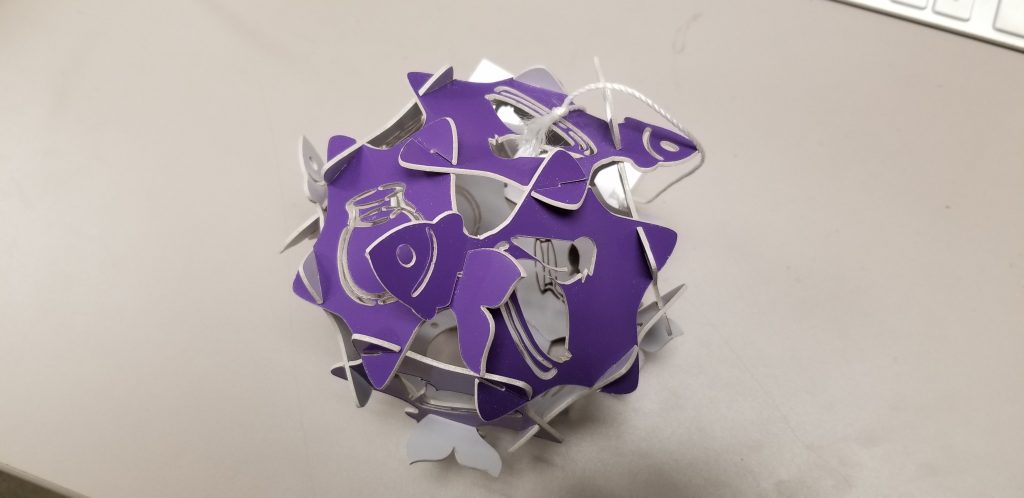
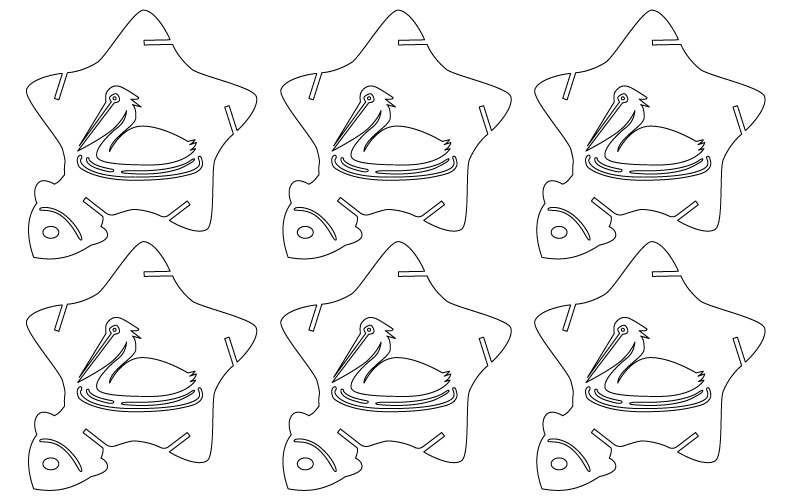
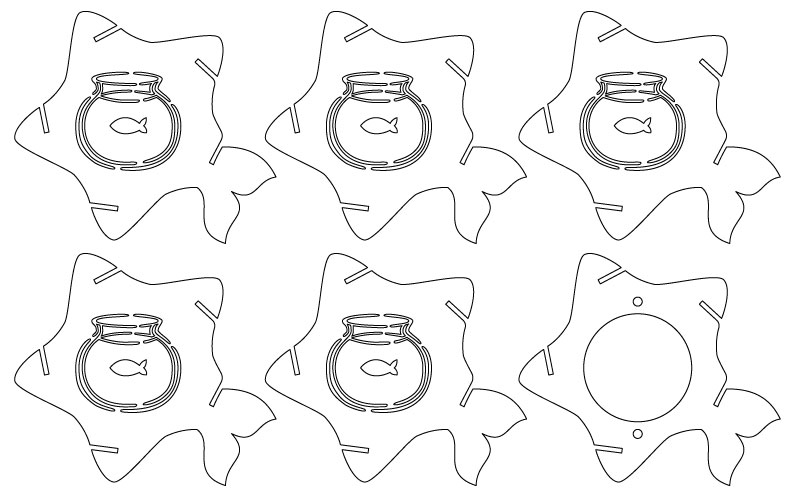
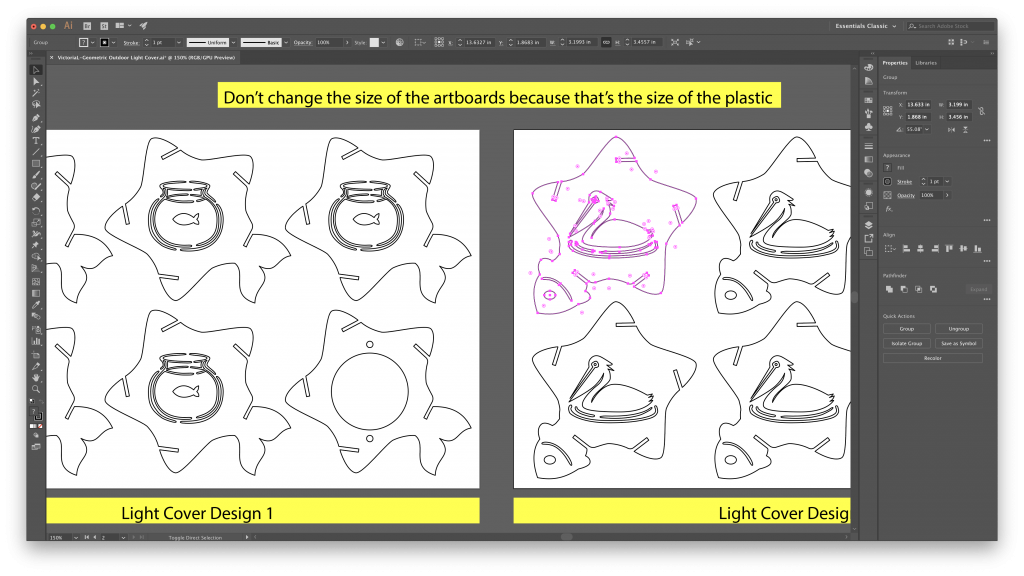
My geometric light cover is titled “Sushi.” Depicted on the light cover is a fish in a bowl and a pelican. I was mostly inspired by the movie “Finding Nemo,” and the scene where Nemo is in the fish tank and the pelican saves him. However, I thought that was incredibly unrealistic, so I chose the title “Sushi” because I think that in reality, the pelican would eat the fish, thus turning the fish into sushi (or more technically, sashimi).
For the message I wish to convey with my design, I want to express my deep love for seafood. I love all things seafood, but most especially sushi and my grandma’s cooking. In my humble but absolutely correct opinion, sushi is one of the most perfect foods out there, and I have lots of respect for sushi chefs. Making sushi requires lots knife skills and knowledge of fish anatomy. I call sushi one of the most perfect foods not because I am a complete weeb, but because it is truly a beautiful dish. Fresh (usually), fatty, fish combined with soft, sweet, sushi rice makes for a delicious and nutritious meal. Fish is also incredibly healthy. Fish oil contains Omega-3, a fatty acid which is good for your brain, and fish is also a very good source of protein. Finally, fish is good for your soul, especially if it was cooked by your grandma. My grandma makes amazing seafood, probably because she is from a fishing town in China. She is also just talented.
One of the things that I struggled the most with this process (as it was an assignment for practicing the use of Adobe Illustrator) was planning out where to put the cuts. It was definitely good practice of my critical thinking skills to decide where to put the “gaps” to make sure that the shapes cut would not just fall out. What I failed to consider was the detail size of the design. For the pelican, I had put in the design some details in the beak and eye, but unfortunately the details were too fragile and broke off when I was punching out the main body of the pelican.
Illustrator Production Project
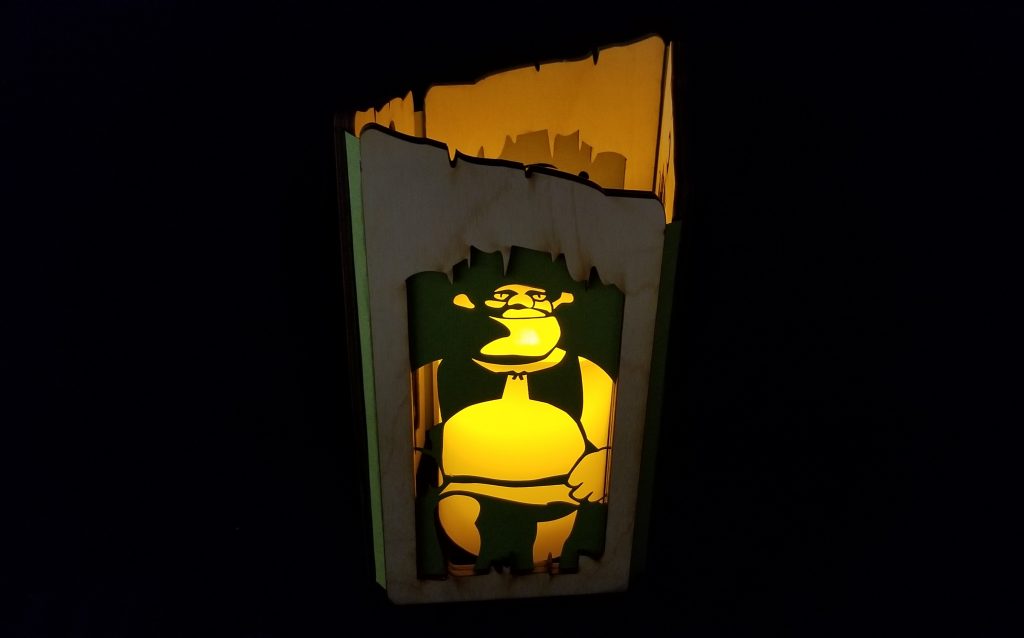
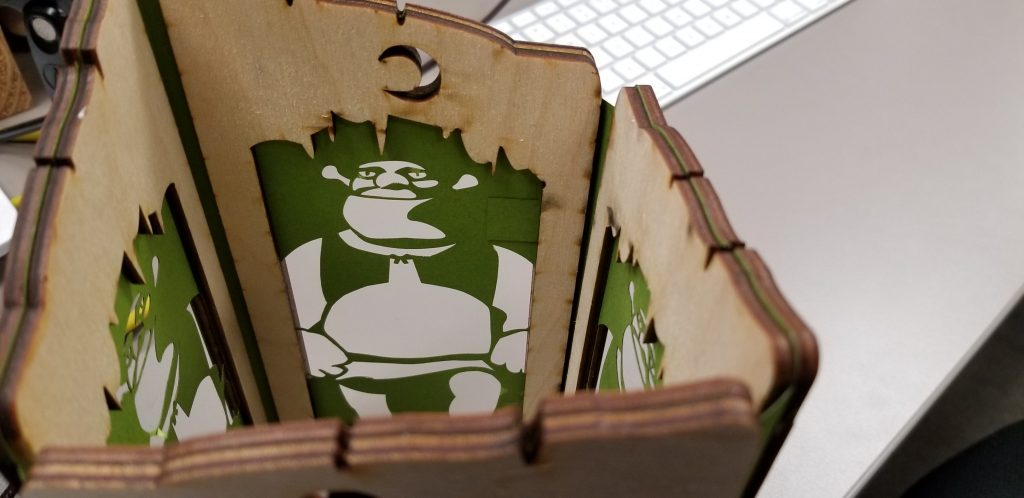
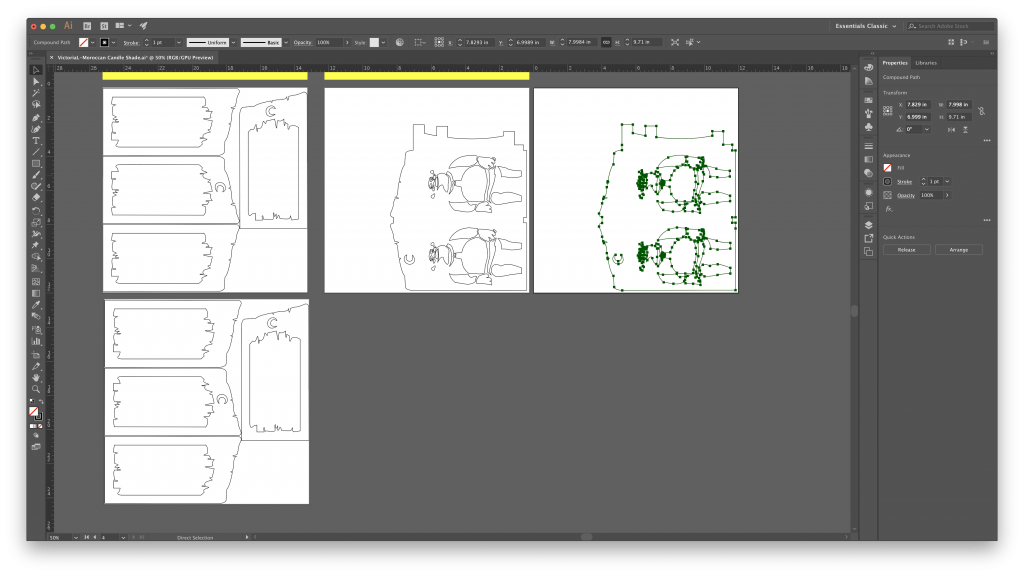
Shrek, both as a movie and a character, is a cultural phenomenon. Often the subject of ridicule and sometimes a catalyst to great profound thought, Shrek may be (so far) one of the greatest movies of my generation. In my opinion, the satirical nature of Shrek is very descriptive of the culture of young people nowadays, because of our tendency to see irony in every part of our lives. There is even a popular phrase, “Shrek is love, Shrek is life,” that encompasses this attitude. With this candle shade, I intend to project Shrek’s image onto my walls and turn “my room” into “my swamp.”
In this project, our prompt was to use Adobe Illustrator to create something physical. Many chose to make stickers or embroidered patches, but out of a desire to be special, I chose to make a Moroccan candle shade. Out of the options that Mr. Florendo gave us, at first the candle shade seemed like the least creative option, because it seemed that we would be limited to using geometric shapes to emulate Moroccan patterns. However, I saw my chance to make something unique and funny. I really valued that this project allowed us to have a lot of freedom in terms of what kind of product we wished to make and what we wished to put on our product, because it was because of that freedom that I could create “My Swamp.”
Animation
Mood Scene & Walk Cycle
For this project, we were tasked to create a puppet and a backdrop, and animate our puppet walking through our scene.
To begin, we created our scene. Using cardboard, paint, and other motley materials, we crafted a three-dimensional backdrop. My group decided that we wanted a Candy land sort of feel, with the cake mountains in the background and the macarons and ice cream in the front. Then, the set was photographed using multicolored lights.
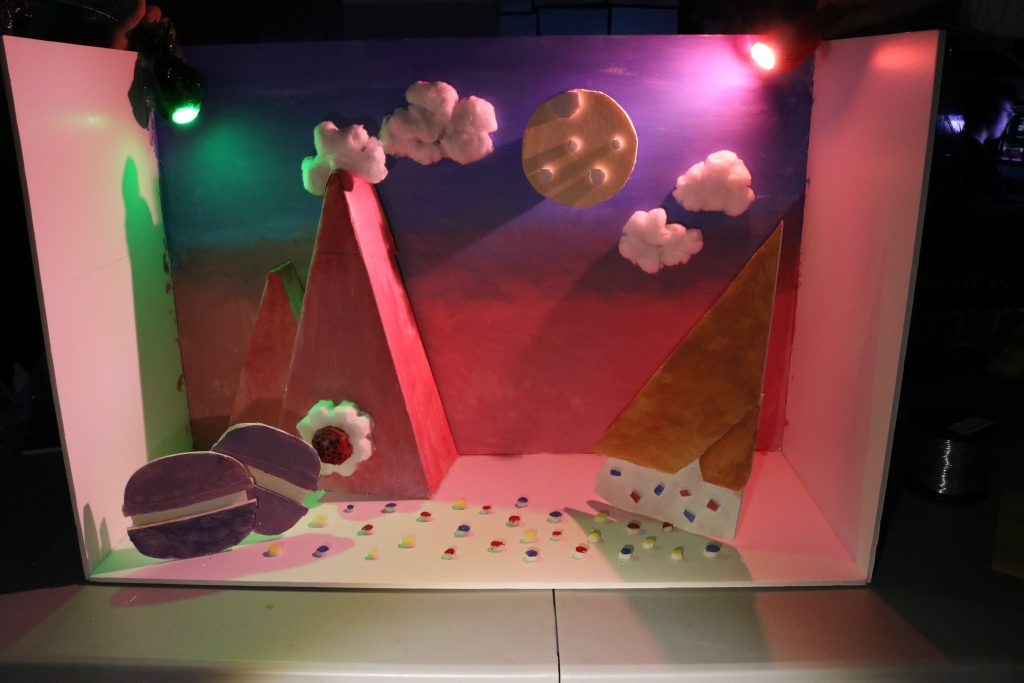
After the backdrop, we started making our puppets. Inspired by our dessert-themed backdrop, I designed a chef. The original drawing and design maybe took two days, but the actual construction of the puppet took over a month. I used a variety of materials and my (hand) sewing skills from middle school to make this. At the bottom of the feet, there are actually holes for a screw, so that a screw can hold up the puppet (Most of the puppets cannot stand on their own).
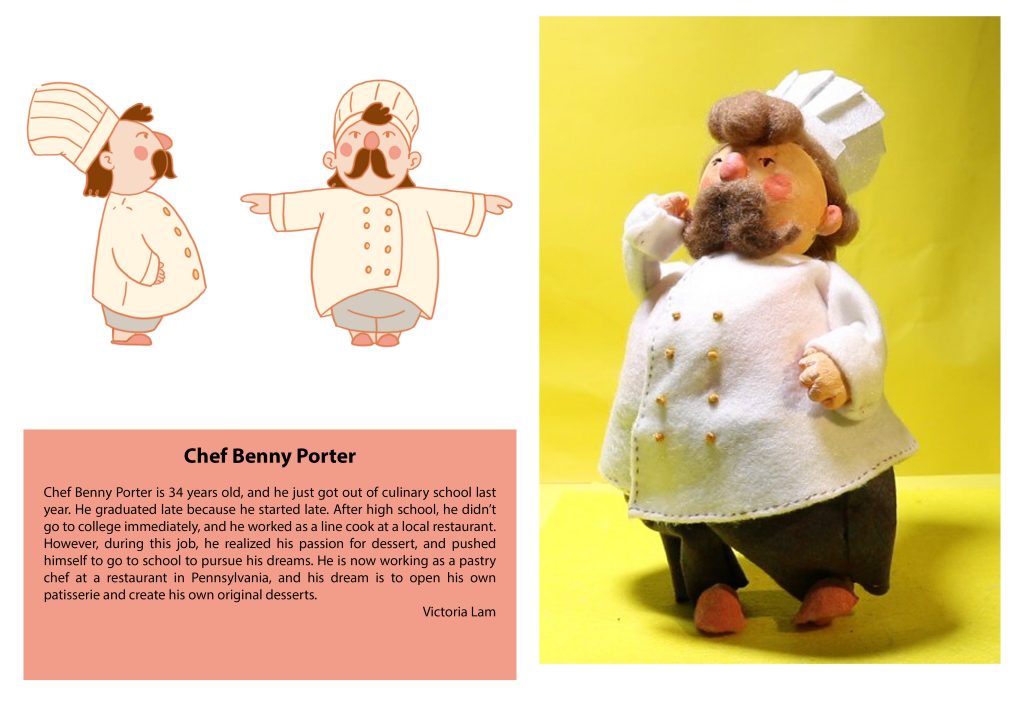
After this, we used Dragon Frame to create the stop-motion animation of the puppet, and Adobe Photoshop to create a drawn animation. We used Adobe After Effects to combine the animations and the mood scene and make our final product. I have two drawn walk cycles because I had some extra time.
Narrative Animation
For this group project, we were assigned to create an animation that told any story, as long as the story had a beginning, middle, and end. We began by brainstorming, and my group quickly decided on a food-related theme (and food seems to be a main theme in lots of my work). We quickly storyboarded our idea and started animating, since we had very limited time. In total, we spent less than a month on this entire process, in comparison to the three months we spent on the mood scene and walk cycles. We used Photoshop to make the individual animations, and we used After Effects to combine them into one video and add sound.
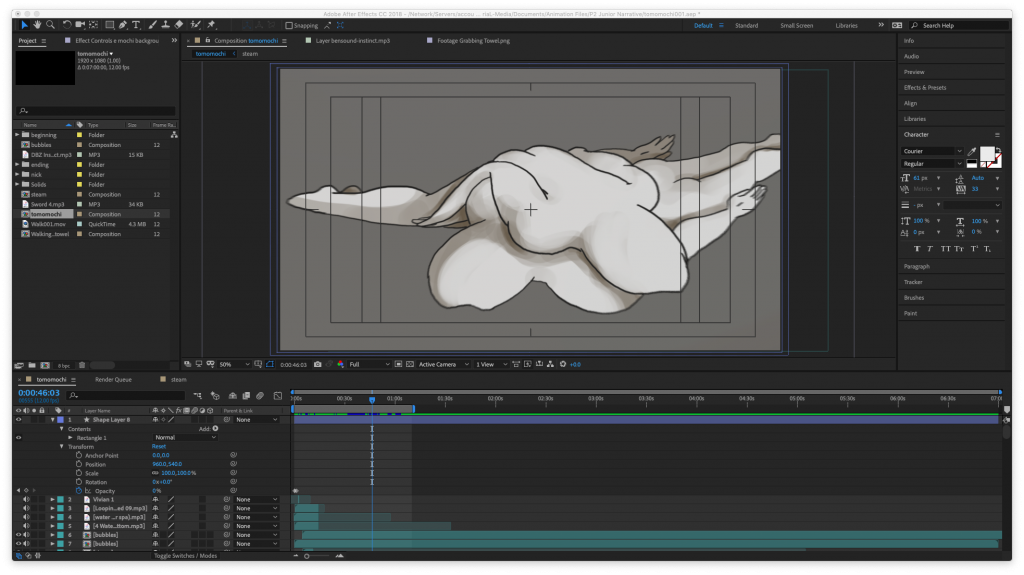
Our story is titled “Tomomochi,” which is a combination of the words “tomodachi,” which means “friend” in Japanese, and “mochi,” the soft rice cake. That name is thought up by Nick, the funny guy in our group. The concept is that two rice grains are hanging out in a hot tub (representing that the rice is being cooked), and they start fighting over a towel. Over time, as they beat each other up (like how mochi is beaten), they get tired and become mochi. This is meant to be a funny video.
Thanks to Vivian and Nick for being great team members, and to Ernest for voicing our boy. And thanks to Mr. Cho for making us keep going.

